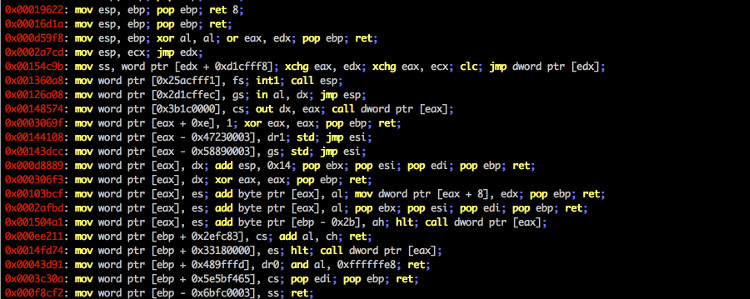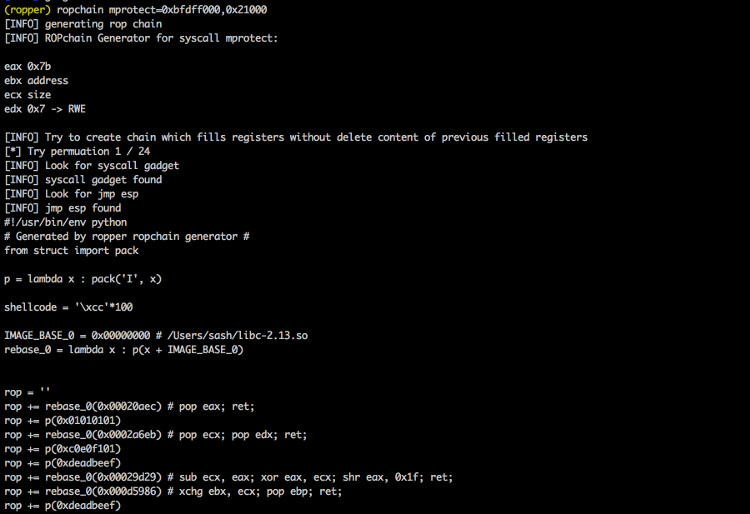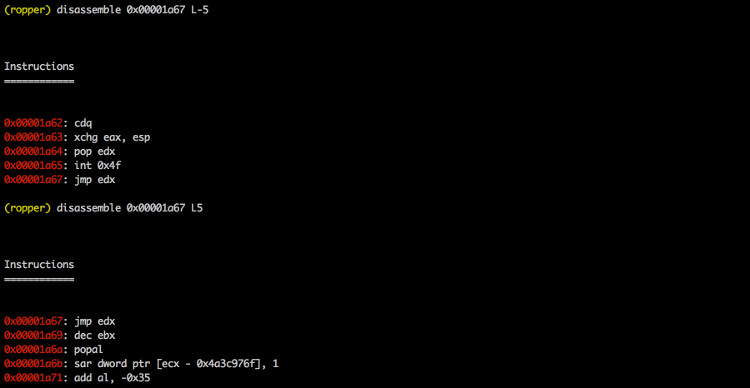You can use ropper to look at information about files in different file formats and you can find ROP and JOP gadgets to build chains for different architectures. Ropper supports ELF, MachO and the PE file format. Other files can be opened in RAW format. The following architectures are supported:
- x86 / x86_64
- Mips / Mips64
- ARM (also Thumb Mode)/ ARM64
- PowerPC / PowerPC64
Ropper is inspired by ROPgadget, but should be more than a gadgets finder. So it is possible to show information about a binary like header, segments, sections etc. Furthermore it is possible to edit the binaries and edit the header fields, but currently this is not fully implemented and in a experimental state. For disassembly ropper uses the awesome Capstone Framework.
Now you can generate rop chain automatically (auto-roper) for execve and mprotect syscall.
usage: Ropper.py [-h] [-v] [--console] [-f <file>] [-r] [--db <dbfile>]
[-a <arch>] [--section <section>] [--string [<string>]]
[--hex] [--disassemble <address:length>] [-i] [-e]
[--imagebase] [-c] [-s] [-S] [--imports] [--symbols]
[--set <option>] [--unset <option>] [-I <imagebase>] [-p]
[-j <reg>] [--stack-pivot] [--inst-count <n bytes>]
[--search <regex>] [--quality <quality>] [--filter <regex>]
[--opcode <opcode>] [--type <type>] [--detailed] [--all]
[--chain <generator>] [-b <badbytes>] [--nocolor]
You can use ropper to display information about binary files in different file formats
and you can search for gadgets to build rop chains for different architectures
supported filetypes:
ELF
PE
Mach-O
Raw
supported architectures:
x86 [x86]
x86_64 [x86_64]
MIPS [MIPS, MIPS64]
ARM/Thumb [ARM, ARMTHUMB]
ARM64 [ARM64]
PowerPC [PPC, PPC64]
available rop chain generators:
execve (execve[=<cmd>], default /bin/sh) [Linux x86, x86_64]
mprotect (mprotect=<address>:<size>) [Linux x86, x86_64]
virtualprotect (virtualprotect=<address iat vp>:<size>) [Windows x86]
optional arguments:
-h, --help show this help message and exit
-v, --version Print version
--console Starts interactive commandline
-f <file>, --file <file>
The file to load
-r, --raw Loads the file as raw file
--db <dbfile> The dbfile to load
-a <arch>, --arch <arch>
The architecture of the loaded file
--section <section> The data of the this section should be printed
--string [<string>] Looks for the string <string> in all data sections
--hex Prints the selected sections in a hex format
--disassemble <address:length>
Disassembles instruction at address <address>
(0x12345678:L3). The count of instructions to
disassemble can be specified (0x....:L...)
-i, --info Shows file header [ELF/PE/Mach-O]
-e Shows EntryPoint
--imagebase Shows ImageBase [ELF/PE/Mach-O]
-c, --dllcharacteristics
Shows DllCharacteristics [PE]
-s, --sections Shows file sections [ELF/PE/Mach-O]
-S, --segments Shows file segments [ELF/Mach-O]
--imports Shows imports [ELF/PE]
--symbols Shows symbols [ELF]
--set <option> Sets options. Available options: aslr nx
--unset <option> Unsets options. Available options: aslr nx
-I <imagebase> Uses this imagebase for gadgets
-p, --ppr Searches for 'pop reg; pop reg; ret' instructions
[only x86/x86_64]
-j <reg>, --jmp <reg>
Searches for 'jmp reg' instructions (-j reg[,reg...])
[only x86/x86_64]
--stack-pivot Prints all stack pivot gadgets
--inst-count <n bytes>
Specifies the max count of instructions in a gadget
(default: 10)
--search <regex> Searches for gadgets
--quality <quality> The quality for gadgets which are found by search (1 =
best)
--filter <regex> Filters gadgets
--opcode <opcode> Searchs for opcodes (e.g. ffe4 or ffe? or ff??)
--type <type> Sets the type of gadgets [rop, jop, sys, all]
(default: all)
--detailed Prints gadgets more detailed
--all Does not remove duplicate gadgets
--chain <generator> Generates a ropchain [generator=parameter]
-b <badbytes>, --badbytes <badbytes>
Set bytes which should not contains in gadgets
--nocolor Disables colored output
example uses:
[Generic]
ropper.py
ropper.py --file /bin/ls --console
[Informations]
ropper.py --file /bin/ls --info
ropper.py --file /bin/ls --imports
ropper.py --file /bin/ls --sections
ropper.py --file /bin/ls --segments
ropper.py --file /bin/ls --set nx
ropper.py --file /bin/ls --unset nx
[Gadgets]
ropper.py --file /bin/ls --inst-count 5
ropper.py --file /bin/ls --search "sub eax" --badbytes 000a0d
ropper.py --file /bin/ls --search "sub eax" --detail
ropper.py --file /bin/ls --filter "sub eax"
ropper.py --file /bin/ls --inst-count 5 --filter "sub eax"
ropper.py --file /bin/ls --opcode ffe4
ropper.py --file /bin/ls --opcode ffe?
ropper.py --file /bin/ls --opcode ??e4
ropper.py --file /bin/ls --detailed
ropper.py --file /bin/ls --ppr --nocolor
ropper.py --file /bin/ls --jmp esp,eax
ropper.py --file /bin/ls --type jop
ropper.py --file /bin/ls --chain execve=/bin/sh
ropper.py --file /bin/ls --chain execve=/bin/sh --badbytes 000a0d
ropper.py --file /bin/ls --chain mprotect=0xbfdff000:0x21000
[Search]
? any character
% any string
Example:
ropper.py --file /bin/ls --search "mov e?x"
0x000067f1: mov edx, dword ptr [ebp + 0x14]; mov dword ptr [esp], edx; call eax
0x00006d03: mov eax, esi; pop ebx; pop esi; pop edi; pop ebp; ret ;
0x00006d6f: mov ebx, esi; mov esi, dword ptr [esp + 0x18]; add esp, 0x1c; ret ;
0x000076f8: mov eax, dword ptr [eax]; mov byte ptr [eax + edx], 0; add esp, 0x18; pop ebx; ret ;
ropper.py --file /bin/ls --search "mov [%], edx"
0x000067ed: mov dword ptr [esp + 4], edx; mov edx, dword ptr [ebp + 0x14]; mov dword ptr [esp], edx; call eax;
0x00006f4e: mov dword ptr [ecx + 0x14], edx; add esp, 0x2c; pop ebx; pop esi; pop edi; pop ebp; ret ;
0x000084b8: mov dword ptr [eax], edx; ret ;
0x00008d9b: mov dword ptr [eax], edx; add esp, 0x18; pop ebx; ret ;
ropper.py --file /bin/ls --search "mov [%], edx" --quality 1
0x000084b8: mov dword ptr [eax], edx; ret ;Using ropper in scripts
#!/usr/bin/env python
from ropper import RopperService
# not all options need to be given
options = {'color' : False, # if gadgets are printed, use colored output: default: False
'badbytes': '00', # bad bytes which should not be in addresses or ropchains; default: ''
'all' : False, # Show all gadgets, this means to not remove double gadgets; default: False
'inst_count' : 6, # Number of instructions in a gadget; default: 6
'type' : 'all', # rop, jop, sys, all; default: all
'detailed' : False} # if gadgets are printed, use detailed output; default: False
rs = RopperService(options)
##### change options ######
rs.options.color = True
rs.options.badbytes = '00'
rs.options.badbytes = ''
rs.options.all = True
##### open binaries ######
# it is possible to open multiple files
rs.addFile('test-binaries/ls-x86')
rs.addFile('ls', bytes=open('test-binaries/ls-x86','rb').read()) # other possiblity
rs.addFile('ls_raw', bytes=open('test-binaries/ls-x86','rb').read(), raw=True, arch='x86')
##### close binaries ######
rs.removeFile('ls')
rs.removeFile('ls_raw')
# Set architecture of a binary, so it is possible to look for gadgets for a different architecture
# It is useful for ARM if you want to look for ARM gadgets or Thumb gadgets
# Or if you opened a raw file
ls = 'test-binaries/ls-x86'
rs.setArchitectureFor(name=ls, arch='x86')
rs.setArchitectureFor(name=ls, arch='x86_64')
rs.setArchitectureFor(name=ls, arch='ARM')
rs.setArchitectureFor(name=ls, arch='ARMTHUMB')
rs.setArchitectureFor(name=ls, arch='ARM64')
rs.setArchitectureFor(name=ls, arch='MIPS')
rs.setArchitectureFor(name=ls, arch='MIPS64')
rs.setArchitectureFor(name=ls, arch='PPC')
rs.setArchitectureFor(name=ls, arch='PPC64')
rs.setArchitectureFor(name=ls, arch='x86')
##### load gadgets ######
# load gadgets for all opened files
rs.loadGadgetsFor()
# load gadgets for only one opened file
ls = 'test-binaries/ls-x86'
rs.loadGadgetsFor(name=ls)
# change gadget type
rs.options.type = 'jop'
rs.loadGadgetsFor()
rs.options.type = 'rop'
rs.loadGadgetsFor()
# change instruction count
rs.options.inst_count = 10
rs.loadGadgetsFor()
##### print gadgets #######
rs.printGadgetsFor() # print all gadgets
rs.printGadgetsFor(name=ls)
##### Get gadgets ######
gadgets = rs.getFileFor(name=ls).gadgets
##### search pop pop ret ######
pprs = rs.searchPopPopRet(name=ls) # looks for ppr only in 'test-binaries/ls-x86'
pprs = rs.searchPopPopRet() # looks for ppr in all opened files
for file, ppr in pprs.items():
for p in ppr:
print p
##### load jmp reg ######
jmp_regs = rs.searchJmpReg(name=ls, regs=['esp', 'eax']) # looks for jmp reg only in 'test-binaries/ls-x86'
jmp_regs = rs.searchJmpReg(regs=['esp', 'eax'])
jmp_regs = rs.searchJmpReg() # looks for jmp esp in all opened files
for file, jmp_reg in jmp_regs.items():
for j in jmp_reg:
print j
##### search opcode ######
ls = 'test-binaries/ls-x86'
gadgets_dict = rs.searchOpcode(opcode='ffe4', name=ls)
gadgets_dict = rs.searchOpcode(opcode='ffe?')
gadgets_dict = rs.searchOpcode(opcode='??e4')
for file, gadgets in gadgets_dict.items():
for g in gadgets:
print g
##### search instructions ######
ls = 'test-binaries/ls-x86'
for file, gadget in rs.search(search='mov e?x', name=ls):
print file, gadget
for file, gadget in rs.search(search='mov [e?x%]'):
print file, gadget
result_dict = rs.searchdict(search='mov eax')
for file, gadgets in result_dict.items():
print file
for gadget in gadgets:
print gadget
##### assemble instructions ######
hex_string = rs.asm('jmp esp')
print '"jmp esp" assembled to hex string =', hex_string
raw_bytes = rs.asm('jmp esp', format='raw')
print '"jmp esp" assembled to raw bytes =', raw_bytes
string = rs.asm('jmp esp', format='string')
print '"jmp esp" assembled to string =',string
arm_bytes = rs.asm('bx sp', arch='ARM')
print '"bx sp" assembled to hex string =', arm_bytes
##### disassemble bytes #######
arm_instructions = rs.disasm(arm_bytes, arch='ARM')
print arm_bytes, 'disassembled to "%s"' % arm_instructions
# Change the imagebase, this also change the imagebase for all loaded gadgets of this binary
rs.setImageBaseFor(name=ls, imagebase=0x0)
# reset image base
rs.setImageBaseFor(name=ls, imagebase=None)
gadgets = rs.getFileFor(name=ls).gadgets
# gadget address
print hex(gadgets[0].address)
# get instruction bytes of gadget
print bytes(gadgets[0].bytes).encode('hex')
# remove all gadgets containing bad bytes in address
rs.options.badbytes = '000a0d' # gadgets are filtered automaticallyDownload
https://github.com/sashs/Ropper (v1.11.0, 29.10.2017)
Changelog
v1.11.0 - Many Bugfixes
- Semantic Search feature (only Python2, BETA)
- Support for Big Endian (Mips, Mips64, ARM)
v1.9.5 - Use of multiprocessing during gadget search only on linux
v1.9.4 - Possibility to install ropper via pip without installing capstone when capstone wasn't installed via pip
v1.9.3 - Use of badbytes in ropchain generators
- Bugfix: Incomplete ropchain using python3, although needed gadgets are available
v1.9.2 - Print gadget addresses +1 for ARMTHUMB
v1.9.1 - Bugfix: Invalid Characters in Opcode
v1.9.0 - Performance Improvements
- Support for Keystone added (asm-command and instruction search)
- Bugfixes
v1.8.0 - Add support for syscall gadgets
- Change implementation to filebytes module
- Add ropchain generator for x86_64 (execve, mprotect)
- Bugfixes
v1.7.3 - Bugfixes
v1.7.2 - Bugfixes
v1.7.1 - Prepare ropper for using in scripts
- Refactoring
- Bugfixes
v1.7.0 - Better ARM support
- Bugfixes
v1.6.0 - Open multiple files and use all gadgets for search and ropchain
Add simple disassembler support
Add hex output of sections similar xxd
Add virtualprotect ropchain generator
Add string search in data sections
Bugfixes
v1.5.4 - Bugfixes
v1.5.3 - Make sqlite support optional
v1.5.2 - Bugfixes
v1.5.1 - Bugfixes
v1.5.0 - Better performance
Sqlite support
Progress
Bugfixes
v1.4.3 - Search syntax changed
Bugfixes
v1.4.0 - Add raw file format support
Port to python 3
Add change arch support
Bugfixes
v1.3.0 - PowerPC and ARM Thumb support
colored output
Bugfixes
v1.2.1 - Bugfixes
v1.2.0 - Rop Chain Generators added
Bugfixes
v1.1.0 - ARM Support
Mach-O Support
Bugfixes
v1.0.3 - Bugfix; ppr search
Bugfix: Info message after file loading failed
v1.0.2 - Bugfix: gadgetsearch
v1.0.1 - Bugfix: set aslr on elf files







